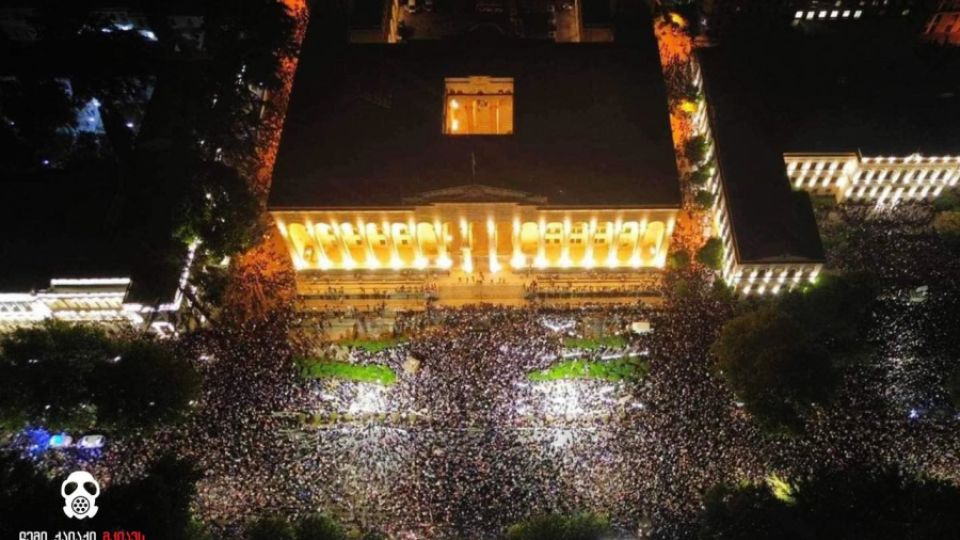Georgia has been rocked by protests against a controversial law that would brand a significant number of NGOs and media outlets as foreign agents. The legislation, dubbed the 'Russian Law', is being pushed through by the ruling Georgian Dream party despite widespread opposition from civil society, including Arnika's local partner, the NGO Green Pole.
Demonstrations against the 'Russian Law' have been taking place since 17 April, when the Georgian parliament passed a law requiring organisations that receive more than 20% of their budget from abroad, such as the Czech Republic, to register as 'defending the interests of a foreign power'. This would then open the door to state control, harassment of media and civil initiatives, their eventual closure or even the persecution of certain journalists and activists.
Not only the protesters on the streets of Tbilisi, but also world leaders and numerous Georgian and foreign institutions warn that the law on foreign agents threatens not only to curb the independence of the media or make it more difficult for Georgians to participate in public affairs, but also to seriously undermine cooperation with the European Union. The legislation, they say, is inspired by a similar tool of repression used by the Kremlin, where it has served for 12 years as a cudgel against a wide range of initiatives that displease the regime. Its current, strengthened version allows it to target virtually anyone in Russia.
"The government's rhetoric about foreign agents is just a thin cover for tightening the screws on civil society here. It is a step towards authoritarianism, which we simply must take to the streets to oppose. We say yes to Europe, no to the Russian law," sums up Nini Toidze, who, together with other colleagues from our partner NGO Green Pole, is taking part in the protests.

Police cracked down on demonstrations in Tbilisi on Tuesday and Wednesday the previous week, using tear gas, water cannons and rubber bullets. More than 60 people were arrested on Tuesday night alone, and at least 15 people ended up in hospital. Police also assaulted and beat several journalists. Many Georgian and foreign organisations and politicians, including Czech Foreign Minister Jan Lipavsky, condemned the attempt to suppress the protests by force.
But people are not giving up. The day after the crackdown, tens of thousands of people took to the streets again, including at Heroes' Square - a major intersection -, virtually blocking traffic in a large part of Tbilisi.

"This is the second year we have helped our Green Pole colleagues monitor air quality and advocate for less pollution. The Georgian public is interested in the environment, and people are increasingly looking for truthful information and want to be involved in decision-making processes. They feel part of a democratic Europe, they want less corruption and a transparent public administration. Unfortunately, political representation is dragging Georgia into the murky waters of authoritarianism and Russian influence. We fully support Georgian civil society and believe that it will succeed in defending an open environment where people can freely participate in public affairs," says Martin Skalsky, an expert on public participation in decision-making, on behalf of Arnika.
Concerns have been raised in civil society about the government's possible intention to silence critical voices ahead of parliamentary elections in October. The founder of the ruling party, Bidzina Ivanishvili, has already used conspiracy theories in his attacks on pro-Western opposition forces, describing rival politicians as tools of foreign intelligence services. Pro-Russian disinformation channels on social media have begun to spread similar rhetoric. Prime Minister Irakli Kobakhidze has not spared strong words: he has long accused NGOs of everything from 'spreading LGBT propaganda' and 'religious extremism' to 'organising revolution'.

The Georgian government's escalation has even been condemned by the European Union. "The development is very worrying and the final adoption of the [foreign agents] regulation would have a negative impact on Georgia's progress towards the EU," the EU's diplomatic service (EEAS) warned in mid-April, adding that the 'Russian law' could threaten freedom of expression and unfairly restrict organisations that benefit Georgian citizens. European Commission President Ursula von der Leyen issued a similar statement. "Georgia is at a crossroads. It should stay on the path towards Europe," she said.
The controversial law has already passed two out of three parliamentary readings. The final round is expected on 13 May (originally 17 May, but the date has been changed). The current events follow the unrest of last spring, when the 'Russian law' passed its first parliamentary reading in a slightly different form. After protests and numerous clashes between citizens and the police, its introduction was averted.







